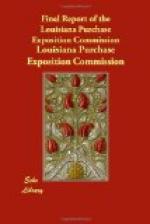with us in promoting an undertaking fraught with
much good to humanity is the earnest wish of the
local management and the sincere hope of every
right-thinking citizen of the American Republic.
Again, I welcome you as guests
whom we delight to honor for your
personal worth, as well as
for what you represent.
Fourth. Music, United States Marine Band, “Marseillaise Hymn of Liberty.”
Fifth. Address by the French ambassador, M. Jean J. Jusserand:
When the treaty signed in Paris one hundred years ago, and by which the area of the United States was to be more than doubled, stood for ratification before Congress, there were, contrary to what we might suppose, protracted discussions and objections of many sorts. Some thought that the title to the new acquisition was not a sufficient one; others were anxious on account of the very magnitude of the new territories, and expressed the fear that the federal tie would be loosened if extended to such remote and partially unknown regions. Many were the criticisms and long the speeches.
Senator Jackson, of Georgia, rose and turning toward one of the hostile parties, said: “In a century, sir, we shall be well populated * * * and instead of the description given of it by the honorable gentleman, instead of howling wilderness where no civilized foot shall ever tread, if we could return at the proper period, we should find it the seat of science and civilization.”
Senator Jackson’s time has come the very year he named; one century has just elapsed since he spoke. If he could return among us, he would see no howling wilderness, but one of the most brilliant gatherings which this country has ever beheld, including the Chief of the State and a former Chief of the State, representatives of all the powers of the globe, soldiers and sailors, priests, magistrates, savants, artists, tradesmen and agriculturists, workmen and citizens innumerable, all bent upon consecrating by their presence and homage the work done during the hundred years. Good work indeed; nay, stupendous.
Sanguine as he was, Senator Jackson would, I think, scarcely believe his eyes and ears if he saw the matchless sight we presently behold, and the preparation for the pending exhibition of the produce, all the discoveries, all the art of the wide earth.
He would scarcely believe his ears if he heard that we came in twenty-seven hours from the place where he had delivered his prophecy and which had become only two years before the seat of Government. No less would be his surprise, if he learned that the supposed “howling wilderness” had been turned into an immense garden, dotted with wealthy towns; that all the land called in his days Louisiana produces yearly now millions of bushels of various kinds of grain, and that the private belongings of the successors of the scattered settlers of his time are valued




